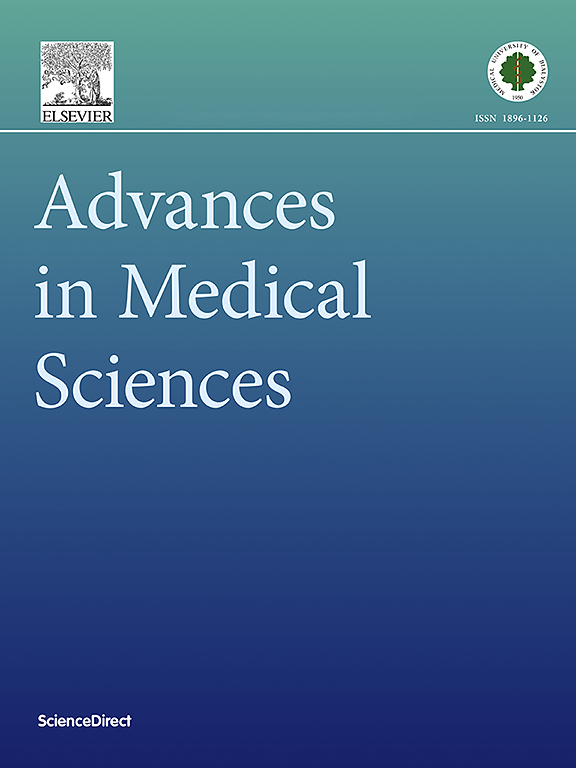血管生成素样 4 在主动脉夹层中通过 PI3K/Akt 信号转导促进人类主动脉平滑肌细胞表型转换和功能障碍。
IF 2.5
4区 医学
Q3 MEDICINE, RESEARCH & EXPERIMENTAL
引用次数: 0
摘要
目的:据报道,血管平滑肌细胞(VSMC)表型转换和功能障碍参与了主动脉夹层(AD)的进展。本研究旨在探讨血管生成素样4(ANGPTL4)在调控血管平滑肌细胞表型转换中的作用:利用公开数据集分析了AD中的关键基因,发现中心差异基因ANGPTL4在AD中上调。通过KEGG信号通路注释验证了相关通路,并利用多个数据集和临床样本验证了ANGPTL4的表达。此外,还研究了ANGPTL4对血小板衍生生长因子-BB(PDGF-BB)处理的人主动脉平滑肌细胞(HASMC)表型的特定功能。研究了 ANGPTL4 和核心信号拮抗剂对 HASMC 表型的动态影响:结果:AD的枢纽基因ANGPTL4明显上调。ANGPTL4与PI3K/Akt信号传导、血管生成、新生血管形成和重塑有关。ANGPTL4 的过表达进一步增强了 PDGF-BB 对 HASMC 表型的影响,包括促进细胞活力和迁移、降低收缩性 VSMC 标志物 α-SMA 和 SM22α、提高 ECM 降解标志物 MMP-2 和 MMP-9,以及促进 PI3K 和 Akt 的磷酸化。敲除 ANGPTL4 可部分消除 PDGF-BB 诱导的收缩/合成 VSMC 失衡和 HASMC 功能障碍。此外,在用PDGF-BB预处理的ANGPTL4过表达的HASMC中,PI3K/Akt信号抑制剂LY294002也部分消除了PDGF-BB处理和ANGPTL4过表达造成的影响:结论:ANGPTL4在AD中明显上调。结论:ANGPTL4在AD中明显上调,ANGPTL4过表达进一步增强了PDGF-BB对HASMC表型转换和功能障碍的影响,这可能与PI3K/Akt信号转导有关。本文章由计算机程序翻译,如有差异,请以英文原文为准。
Angiopoietin-like 4 facilitates human aortic smooth muscle cell phenotype switch and dysfunctions through the PI3K/Akt signaling in aortic dissection
Purpose
Vascular smooth muscle cell (VSMC) phenotype switch and dysfunctions have been reported to participate in aortic dissection (AD) progression. This study was aimed to investigate the role of angiopoietin-like 4 (ANGPTL4) in regulating VSMCs phenotype switch.
Materials and methods
Key genes were analyzed in AD using public datasets, and it was found that the central differential gene ANGPTL4 was up-regulated in AD. The KEGG signaling pathway annotation was performed to validate the associated pathways, and the expression of ANGPTL4 was verified using multiple datasets and clinical samples. Furthermore, the specific functions of ANGPTL4 on platelet-derived growth factor-BB (PDGF-BB)-treated human aortic smooth muscle cell (HASMC) phenotypes were investigated. The dynamic effects of ANGPTL4 and core signaling antagonists on HASMC phenotypes were examined.
Results
Hub gene ANGPTL4 was significantly up-regulated in AD. ANGPTL4 was linked to the PI3K/Akt signaling, angiogenesis, and neovascularization and remodeling. ANGPTL4 overexpression further enhanced PDGF-BB effects on HASMC phenotypes, including promoted cell viability and migration, decreased contractile VSMC markers α-SMA and SM22α, elevated ECM degradation markers MMP-2 and MMP-9, and promoted phosphorylation of PI3K and Akt. ANGPTL4 knockdown partially abolished PDGF-BB-induced contractile/synthetic VSMCs imbalance and HASMC dysfunctions. Furthermore, in ANGPTL4-overexpressing HASMCs pre-treated with PDGF-BB, the PI3K/Akt signaling inhibitor LY294002 also partially eliminated the effects caused by the PDGF-BB treatment and ANGPTL4 overexpression.
Conclusions
ANGPTL4 is significantly up-regulated in AD. ANGPTL4 overexpression further enhanced PDGF-BB effects on HASMC phenotype switch and dysfunctions, which might be involved in the PI3K/Akt signaling.
求助全文
通过发布文献求助,成功后即可免费获取论文全文。
去求助
来源期刊

Advances in medical sciences
医学-医学:研究与实验
CiteScore
5.00
自引率
0.00%
发文量
53
审稿时长
25 days
期刊介绍:
Advances in Medical Sciences is an international, peer-reviewed journal that welcomes original research articles and reviews on current advances in life sciences, preclinical and clinical medicine, and related disciplines.
The Journal’s primary aim is to make every effort to contribute to progress in medical sciences. The strive is to bridge laboratory and clinical settings with cutting edge research findings and new developments.
Advances in Medical Sciences publishes articles which bring novel insights into diagnostic and molecular imaging, offering essential prior knowledge for diagnosis and treatment indispensable in all areas of medical sciences. It also publishes articles on pathological sciences giving foundation knowledge on the overall study of human diseases. Through its publications Advances in Medical Sciences also stresses the importance of pharmaceutical sciences as a rapidly and ever expanding area of research on drug design, development, action and evaluation contributing significantly to a variety of scientific disciplines.
The journal welcomes submissions from the following disciplines:
General and internal medicine,
Cancer research,
Genetics,
Endocrinology,
Gastroenterology,
Cardiology and Cardiovascular Medicine,
Immunology and Allergy,
Pathology and Forensic Medicine,
Cell and molecular Biology,
Haematology,
Biochemistry,
Clinical and Experimental Pathology.
 求助内容:
求助内容: 应助结果提醒方式:
应助结果提醒方式:


